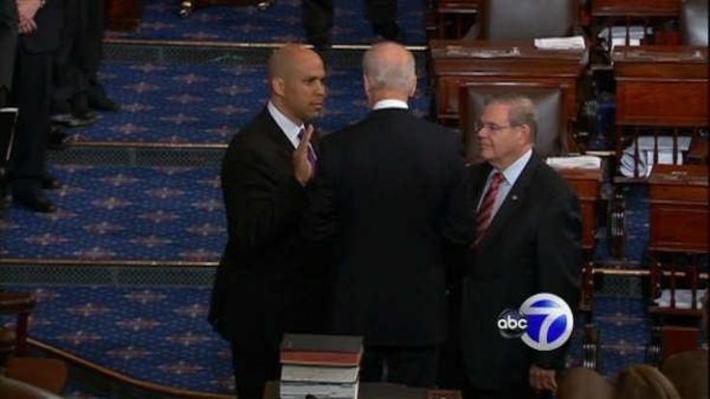Outside of New Jersey, Cory Booker is probably best known for running into a burning building to save a woman’s life. Inside New Jersey, he's better known for trying -- with mixed results -- to turn around the state's biggest and perhaps most troubled city, Newark. Nowhere has he made a particular name for himself on transportation.
That all might change. Mayor Booker became Senator Booker yesterday, replacing Frank Lautenberg, whose support for rail transport was so integral to his identity that his casket was carried to Washington on an Amtrak train.
Not only will Booker replace Lautenberg in the Senate, he’s replacing Lautenberg on two key committees with jurisdiction over transportation: the Environment and Public Works Committee, which is in charge of crafting the surface transportation bill, and the Commerce, Science and Transportation Committee, which authors the bill's rail and "safety" portions.
The Commerce committee authored laudable rail and safety legislation for MAP-21, only to see it get left on the cutting room floor. That was a shame, because it included an important provision for multiplying complete streets policies around the country -- a goal Cory Booker shares.
Booker was enthusiastic last year when Newark passed a complete streets policy, boasting, “Newark’s streets will be the safest and most welcoming in the entire nation.”
“We have taken a holistic approach to making our streets and sidewalks safe and accessible for all of our residents and visitors, whether they walk, drive, or bicycle,” he said. Booker himself is always game for a bike ride.
Note that New Jersey’s policy was given a fair-to-middling rating of 45.6 out of 100 in Smart Growth America’s scoring [PDF].
In a forum with AARP the week after the bill's passage, Booker emphasized his commitment to complete streets. “This to me is an urgent issue,” he said. “We in the United States of America -- as well as here in the state of New Jersey -- face a real problem with vehicular pedestrian accidents.”
“Seniors feel more and more trapped in their own home because crossing major intersections is more and more difficult for them,” he said, speaking directly to AARP’s constituency. “So we feel like we had a responsibility to charge forward from where we were -- one of the more dangerous vehicular-pedestrian incident cities in America -- to where we aspire to be, which is a model for our nation.”
Hailing, as he does, from a heavily urbanized state, where many residents count on trains and buses to commute to New York City or (to a lesser extent) Philadelphia, Booker should be keenly aware of the importance of transit, both to his state and to the nation. Let's hope he projects a strong voice for transit and safe streets as the committees he sits on enter the next reauthorization cycle for surface transportation.






